This tincture is a drop more involved. We joined forces to bring you 14ER’s strain-specific Live Rosin with unique nanoQuick technology,…
Tis the High Holidaze! We hope you’re having a solid 420 and that you’re floating about your day in absolute bliss. This 420 we’re celebrating flavor in more ways than one…
It’s the day before the big day. That means there’s heaps of 420 specials to get in on…
Holy-Hash Hole-Moly. We couldn’t be more excited to have collabed with the fine folks at @lazercat.official…
Have you ever been captivated by the shimmering beauty of cannabis?
Those glistening trichomes are the unsung heroes behind the allure of cannabis, small yet powerful growths that harbor the plant’s most coveted compounds like THC and CBD.
Embark on a journey with us as we delve into the enigmatic world of trichomes. From their lifecycle to cultivation techniques aimed at maximizing their potential, we’ll uncover how these tiny factories enhance the cannabis experience, infusing each strain with distinct richness and complexity.
What Exactly Are Trichomes?
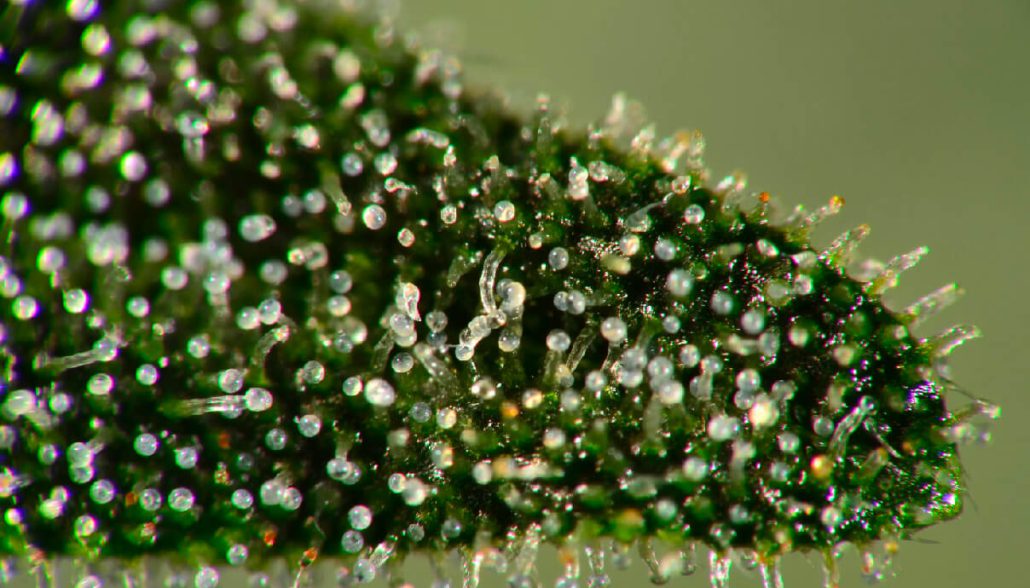
Image Source: GrowDiaries
Trichomes are minuscule outgrowths primarily found on cannabis flowers and leaves. Beyond mere adornments, these glandular structures act as the plant’s artisans, transforming sunlight and raw materials into cannabinoids like THC and CBD, as well as terpenes that define a strain’s effects, aromas, and medicinal properties.
These aromatic oils not only give each strain its unique scent but also play a pivotal role in augmenting the cannabinoids’ interactions with our bodies, contributing to what is known as the entourage effect. The density and maturity of trichomes serve as reliable indicators of a strain’s potency and overall quality, guiding cultivators and consumers alike in their pursuit of the perfect cannabis experience.
Decoding Trichome Anatomy: Types and Functions

Image Source: Adobe Stock
Trichomes come in various shapes and sizes, ranging from barely noticeable protrusions to elaborate glandular heads.
While some trichomes persist throughout the plant’s lifecycle, others may shed prematurely in response to environmental conditions.
There are three primary types of trichomes found on cannabis plants, each with its distinct form and function:
Bulbous Trichomes
These tiny trichomes are invisible to the naked eye and contribute less to the plant’s chemical composition, although they lend cannabis its sparkling appearance and sticky texture.
Capitate-Sessile Trichomes
Slightly larger and sporting a mushroom-like head, these trichomes begin synthesizing cannabinoids and terpenes, the compounds responsible for the plant’s effects and aroma. While they are primarily found beneath the leaves and require magnification to be seen, some of these trichomes transition into the next type as the plant matures.
Capitate-Stalked Trichomes
Visible to the naked eye, these trichomes resemble miniature mushrooms with a stalk and bulbous head. Predominantly located on the flowers, they are the primary producers of cannabinoids and terpenes, playing a crucial role in determining the plant’s potency and the diverse scents and flavors associated with different strains.
Trichomes in Cultivation: Nurturing Nature’s Artistry
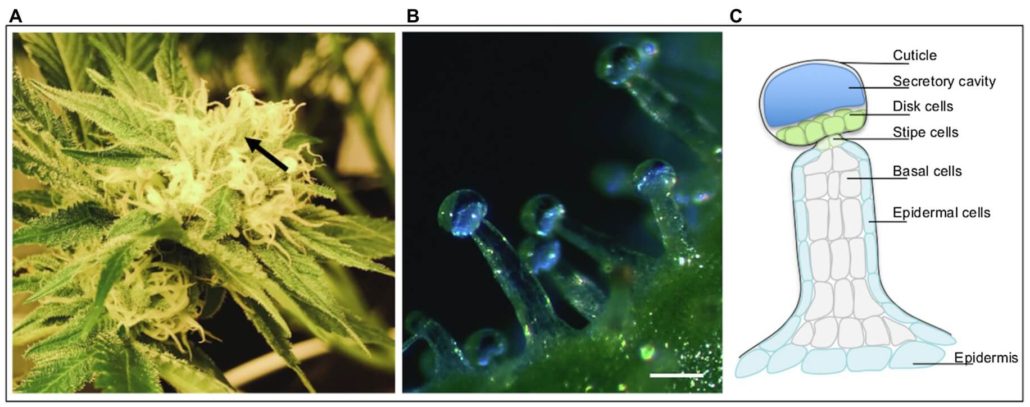
Image Source: Frontiers
Life Cycle
During the vegetative phase, which lasts 2 to 12 weeks, cannabis plants focus on growth, laying down the structural foundation with minimal trichome development. However, as they transition to the flowering stage, trichomes undergo a transformative process.
The color change of trichomes serves as a vital indicator for growers to identify the optimal harvest time, ensuring a balance of desired effects and flavors. Different trichome colors signify varying stages of development:
Clear Trichomes
Transparent trichomes indicate ongoing resin production but lack sufficient cannabinoid concentration for desired potency. Harvesting at this stage may not yield the full spectrum of effects.
Cloudy Trichomes
Cloudy trichomes signify peak cannabinoid levels, indicating an optimal harvesting window for maximum potency. Harvesting at this stage is ideal for achieving a balanced effect.
Amber Trichomes
The transition to amber suggests a shift towards more sedative effects, desirable for certain cultivars. However, it also indicates THC degradation, emphasizing the importance of timing for preserving potency.
Mixed Trichomes
Hybrid strains present a blend of effects, with the ideal harvest time depending on the desired balance between cerebral and physical experiences.
Harvest Time: The Trichome Touchstone
Harvesting cannabis is intricately linked to trichome observation. Clear trichomes indicate underdevelopment, while milky trichomes suggest peak potency with more cerebral effects. Amber trichomes lean towards sedative qualities or signal possible cannabinoid degradation.
Choosing the right moment to harvest depends on the desired effects, whether aiming for a lively, sativa-like experience or a profound, indica-driven calm.
Maximizing Potency: Cultivating Trichome Brilliance
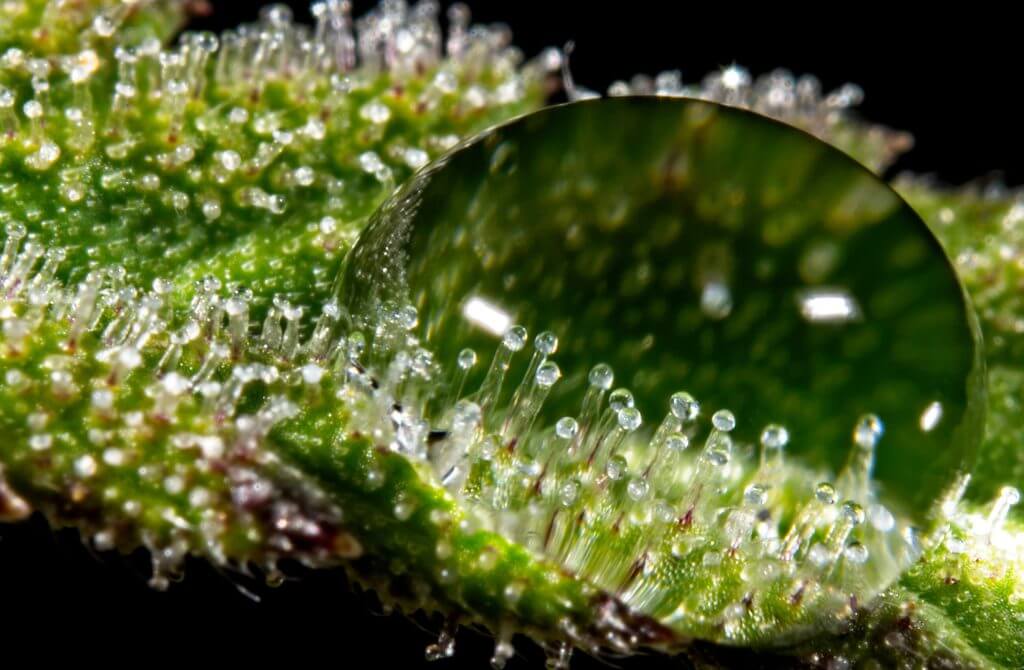
Image Source: Sensi Seeds
Trichome production is influenced by environmental conditions such as temperature, humidity, light intensity, and nutrient availability. Creating optimal conditions can enhance trichome production:
Provide Adequate Lighting
Trichomes thrive in well-lit environments. High-quality grow lights that mimic sunlight spectrum encourage trichome growth and resin production.
Maintain Ideal Environment
During the flowering stage, maintain optimal conditions with humidity around 30-40% and temperatures near 26°C to support trichome and terpene development.
Implement Plant Training
Training techniques like low-stress and high-stress training help distribute hormones across the plant, promoting trichome production and resin-rich flowers.
Provide Nutrient Support
Phosphorus and potassium are crucial for trichome development during the flowering stage. Tailor nutrient mixtures to meet the specific needs of each strain for optimal trichome production.
Consider Strain Variability
Different strains have unique preferences for environmental conditions. Understanding and catering to these preferences can further enhance trichome production, ensuring each strain reaches its full potential.
In conclusion, trichomes are the unsung heroes behind cannabis’s brilliance, enriching each puff with potency and complexity. So, the next time you admire those sparkling crystals on cannabis, remember the intricate world of trichomes working tirelessly to enhance your experience. Cheers to trichomes, nature’s exquisite craftsmanship elevating cannabis to new heights.
Heads up! Starting March 17th there will be a shift in hours of operation. SUN-THU will be 10am-8pm and…
Holy-Hash Hole-Moly. We couldn’t be more excited to collab with the fine folks at @lazercat.official. It’s our powers combined…
14ER herb wins awards, but we also win hearts and minds and lungs and taste buds…
In the ever-evolving landscape of cannabis research, a remarkable discovery has recently emerged: a spotlight shines upon a lesser-known cannabinoid known as Tetrahydrocannabivarin, or THCV. Unlike its more renowned counterpart, delta-9 THC, THCV appears to offer stimulating effects without the notorious “munchies” or fatigue often associated with marijuana consumption. This revelation stems from a groundbreaking double-blind clinical study conducted jointly by Phylos, a leading cannabis genetics company, and People Science, a prominent marijuana research firm.
On a momentous Tuesday, Phylos, a pioneering cannabis genetics company, joined forces with the esteemed marijuana research firm People Science to unveil the findings of their groundbreaking study. This research endeavor heralded a significant breakthrough, showcasing the remarkable effects of a THCV product on enhancing energy, activity levels, motivation, and overall well-being, distinctly surpassing those of a placebo.
Often dubbed as “diet weed” due to its intriguing lack of appetite-inducing properties, THCV stands out amidst the plethora of cannabis constituents saturating the market. Its emergence has sparked a wave of curiosity and excitement within the scientific community and beyond.
Under the auspices of an Institutional Review Board, researchers meticulously orchestrated a study involving 78 participants. These individuals were administered various formulations, including unmedicated placebo gummies, delta-9 THC-only gummies, and gummies infused with Phylos’s innovative THCV-dominant plant extract, aptly named “Get Sh!t Done.”
The outcomes were nothing short of remarkable. Analysis revealed that a notable 20 percent of participants who received THCV-infused gummies reported heightened feelings of vigor and vitality compared to their counterparts who received placebos. Furthermore, a staggering 40 percent expressed increased enjoyment in their daily activities following consumption of this novel cannabinoid.
In stark contrast, half of the participants who consumed the standard THC-only gummies reported experiencing heightened hunger—a phenomenon conspicuously absent in the THCV group. Moreover, those in the THC-only cohort were three times more likely to report feelings of fatigue compared to their THCV-consuming counterparts.
Both THC-only and THCV-infused gummies demonstrated significant enhancements in activity levels, exercise performance, motivation, and overall well-being compared to the placebo, as attested by Phylos.
Although the study employed a rigorous double-blind methodology, it awaits publication in a peer-reviewed scientific journal, underscoring the need for further scrutiny and validation within the scientific community.
Alisha Holloway, Chief Scientific Officer at Phylos, lauded the study as a pivotal moment for the cannabis industry, emphasizing its profound implications for understanding the synergistic effects of THCV in conjunction with THC. She hailed the “Natural Natural THCV study” as a cornerstone in advancing targeted cannabis products, poised to redefine the landscape of natural cannabinoid therapeutics.
Indeed, this research endeavor marks a transformative juncture, propelling the cannabis industry into uncharted territories of innovation and discovery, poised to revolutionize the understanding and application of natural cannabinoids.
Whitney Conroy, the Chief Commercial Officer at Phylos, underscored the burgeoning demand among consumers for access to natural, science-backed wellness products. “Consumers are seeking and deserve access to natural, plant-based wellness products that are backed by science,” Conroy emphasized, articulating a sentiment that resonates deeply within the industry.
She elaborated on the commitment of “Natural Natural” to forging partnerships with the crème de la crème of growers, extractors, and brands. This collaboration aims to ensure that consumers are not only aware of the products they purchase but also assured of their impeccable quality and proven efficacy. By prioritizing transparency and integrity, “Natural Natural” endeavors to set a gold standard in the realm of natural cannabinoid-based therapeutics.
Meanwhile, within the scientific community, researchers are diligently exploring the untapped potential of minor cannabinoids such as THCV. As awareness surrounding the therapeutic benefits of individual components of marijuana continues to expand, there is a growing impetus to unravel the multifaceted properties of these compounds.
For instance, a recent peer-reviewed study delved into the therapeutic potential of lesser-known cannabinoids derived from both hemp and marijuana. The study, published last year, shed light on the possibility of compounds like THCV offering promising avenues for the treatment of dermatological ailments such as psoriasis, eczema, and acne, signaling a paradigm shift in medical cannabis research.
Despite the growing body of research, the exact mechanisms underlying THCV’s unique effects compared to delta-9 THC remain a subject of intrigue. While the latest study did not delve into these mechanisms, prior research suggests that THCV, particularly in lower concentrations, may act as an antagonist rather than an agonist of the CB1 endocannabinoid system receptor. This distinction potentially enables consumers to circumvent certain common effects associated with delta-9 THC, such as increased appetite.
Moreover, recent revelations from researchers at Washington State University (WSU) have illuminated the intricate neural pathways through which cannabis stimulates appetite. Specifically, they unveiled how cannabis activates a specific cluster of neurons in the hypothalamus region of the brain, providing invaluable insights into its appetite-stimulating properties.
In essence, the convergence of scientific inquiry, industry innovation, and consumer demand underscores a transformative era in the realm of cannabis research and therapeutics, poised to redefine wellness paradigms and pave the way for enhanced health and well-being.
Exploring the world of cannabis unveils a rich tapestry of scents, flavors, and effects intricately woven by nature’s aromatic compounds known as terpenes. These organic molecules not only define the olfactory experience but also contribute significantly to the nuanced effects of various cannabis strains. In this comprehensive exploration, we embark on a journey to understand the intricate mechanisms behind terpene production in cannabis plants and unveil the top 10 most abundant terpenes, each with its distinct characteristics and potential therapeutic benefits.
Terpenes represent significant constituents within marijuana resin, paralleling their prevalence in the aromatic essential oils found abundantly across various plant species. These oils, comprising the essence of most flowers, herbs, and spices, bear the distinctive hallmark of terpenes. A mere pinch of a cannabis bud releases these fragrant molecules, a sensory cue familiar to connoisseurs. Whether encountering the citrus zest of Grapefruit, the earthy allure of Silver Haze, or the fruity notes of Blueberry, each aroma hints at the ensuing psychoactive experience. Notably, terpene production escalates as the plant prioritizes reproduction, amplifying the bouquet as flowering advances. From the subtle whispers preceding blossoming to the robust fragrance enveloping mature buds, terpenes serve as heralds of cannabis’s developmental journey.
As Cannabis Progresses Through Its Reproductive Stages, It Initiates The Synthesis Of Terpenes Within The Glands Enveloping Its Flowers.
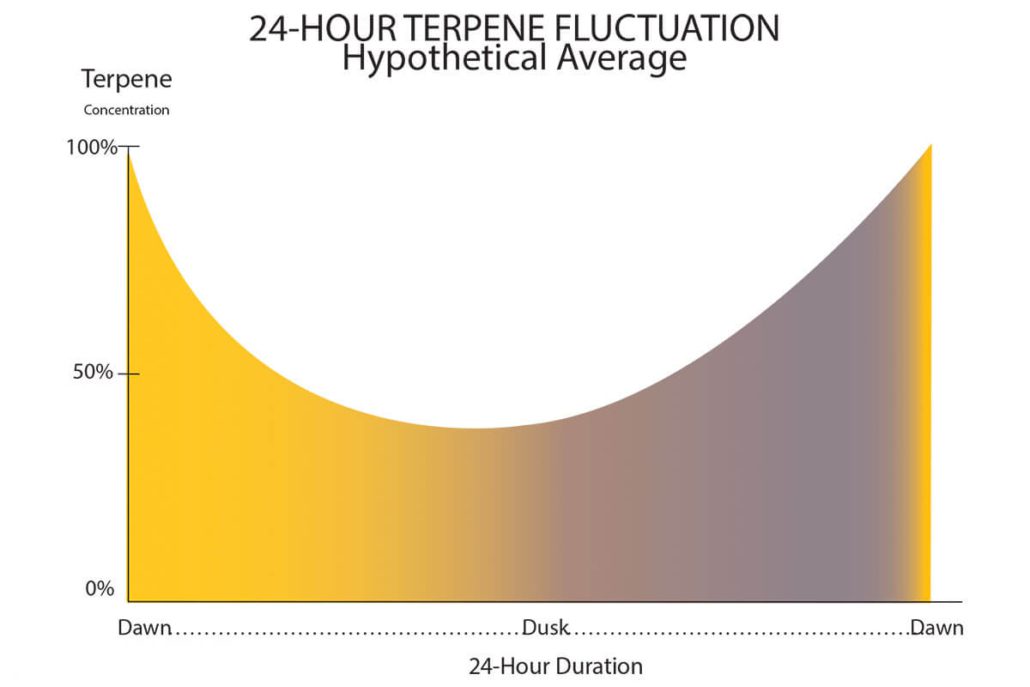
Image source: Ed Rosenthal
Terpene concentrations ascend during the nocturnal phase, peaking just before dawn, only to dissipate throughout the day, permeating the surroundings with their distinct aroma as a natural deterrent against potential threats. Come dusk, both terpene and cannabinoid levels ebb to their nadir.
The aromatic symphony we attribute to plants predominantly owes its existence to terpenes and flavonoids. While perceptible to our senses of smell and taste, these compounds wield influence beyond mere sensory perception. Terpenes, in particular, exert a nuanced impact on brain function, subtly altering the psychoactive effects of THC. This modulation extends to mood, sensitivity, and cognitive faculties, encompassing realms like balance and pain perception.
Certain terpenes exert their influence by binding to specific receptor sites in the brain, thereby modulating neurotransmitter release or altering membrane permeability, thereby regulating the influx of THC. Others intervene in neurotransmitter systems like serotonin and dopamine, modulating their activity and dynamics. This intricate interplay of terpenes orchestrates a diverse array of effects on mood, cognition, and bodily sensations.
The amalgamation of terpenes, as found in natural plant oils, engenders a complex interaction wherein each constituent contributes to the overall impact on brain function. Some combinations synergize, enhancing desired effects, while others may act antagonistically. Nevertheless, the unique composition of terpenes in each botanical blend crafts a distinctive “recipe” that shapes individual mood states and emotional experiences.
More Than A Hundred Terpenes Have Been Discovered In Cannabis.
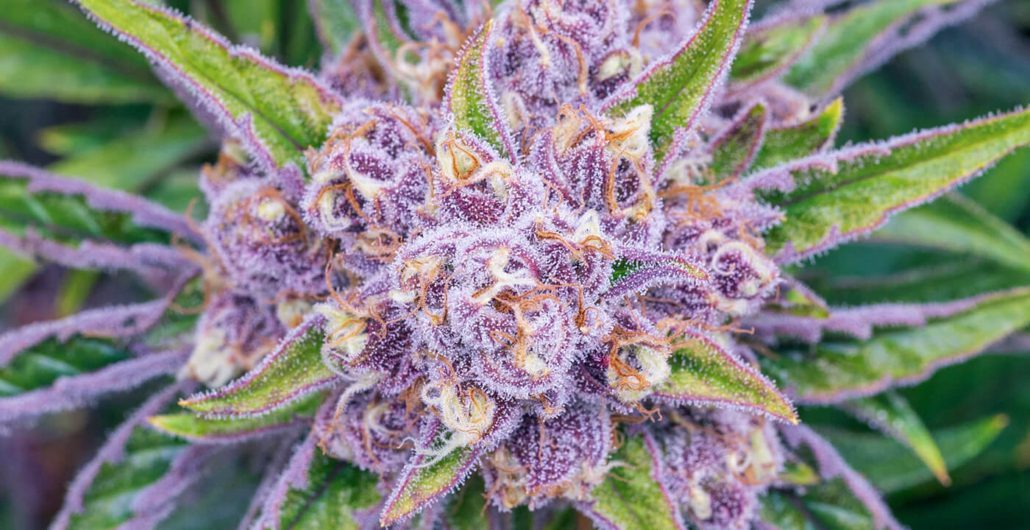
Image source: surterra
More than a hundred distinct terpenes have been cataloged within the cannabis plant. Yet, this number belies the true diversity when considering the myriad variations of each terpene. Take, for example, the unmistakable citrus scent present in fruit rinds; while oranges and lemons emanate differing aromas, their terpenes, known as limonenes, exhibit near-mirror images of each other. These subtle discrepancies stem from variations in limonene quantities and other contributing compounds within citrus fruits.
Terpenes, synthesized within the trichomes of cannabis, share the same biosynthetic origin as THC. Comprising approximately 10-30% of marijuana smoke resin, these aromatic compounds exist in a complex array, with some terpenes sporadically appearing while others remain consistently present. The composition and proportions of terpenes vary widely among cannabis cultivars, manifesting in distinct olfactory profiles that discerning enthusiasts readily discern.
Interestingly, parallels between cannabis terpenes and those found in common herbs like black pepper have been noted by researchers, suggesting a broader botanical convergence in terpene production. This synthesis occurs within the trichomes, where THC production also takes place.
The cyclical rhythms of cannabis growth further influence terpene production, with plants typically harboring higher terpene levels following the dark period. Environmental factors such as temperature, humidity, and light exposure play pivotal roles, with terpene concentrations fluctuating in response. Notably, terpenes evaporate readily under sunlight and elevated temperatures, resulting in diminished levels during peak daylight hours.
Moreover, environmental conditions, including climate, soil composition, and cultivation practices, profoundly impact terpene and flavonoid expression. Even within a single cannabis variety, variations in terpene profiles can arise, reflecting the intricacies of cultivation methods and environmental influences.
In essence, the captivating symphony of cannabis terpenes unfolds against a backdrop of dynamic environmental interactions, shaping the nuanced aromatic and therapeutic qualities cherished by cannabis aficionados worldwide.
Presented Below Are 10 Terpenes Typically Found In Abundance Within Cannabis.
Variations among individual plants are considerable, not only in the overall terpene content but also in the ratios of these aromatic compounds.
10. CINEOLE
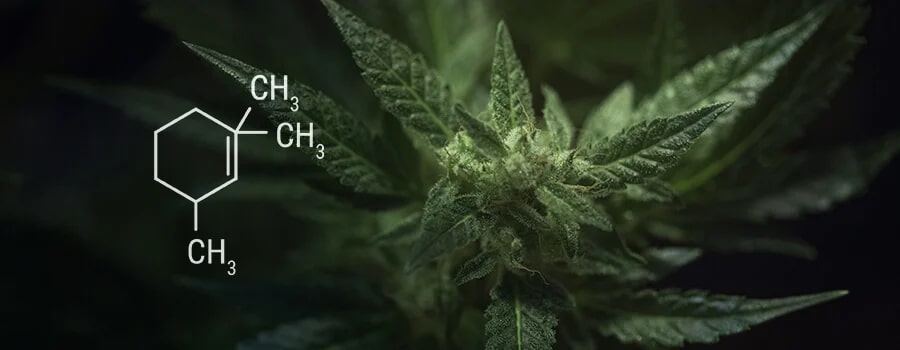
Image source: royalqueenseeds
Cineole, the predominant compound found in eucalyptus oil, emits a distinctive camphor-minty fragrance reminiscent of pulegone. Beyond its association with eucalyptus, cineole is also encountered in various other aromatic plants. Moreover, while present in minor quantities, traces of cineole can be detected within marijuana, contributing subtly to its overall aroma and flavor profile.
9. PULEGONE

Image source: leafwell
Pulegone is characterized by its invigorating minty-camphor aroma and flavor, which are frequently utilized in the confectionery industry to impart a refreshing taste sensation. Despite its subtle presence, pulegone can be discerned in trace amounts within marijuana, contributing a nuanced layer of its unique essence to the overall olfactory and gustatory profile of the plant.
8. LINALOOL
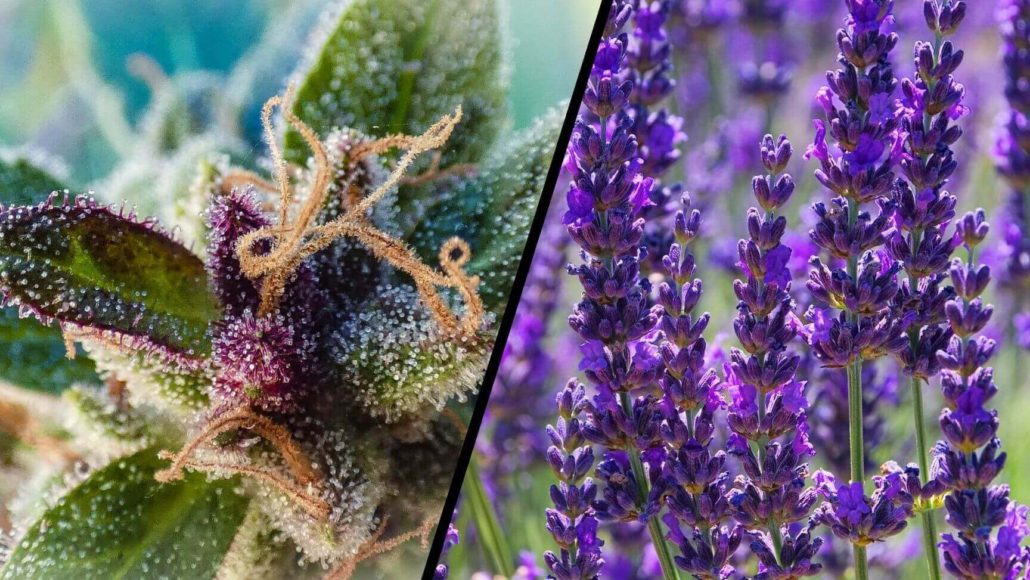
Image source: hydroponique
Linalool emanates a delicate floral scent reminiscent of the blossoms of spring, particularly evoking the fragrant allure of lily of the valley, complemented by subtle spicy undertones. Derived from sources such as lavender, neroli, and various essential oils, this aromatic compound possesses a remarkable potency, with humans capable of detecting it in the air even at minute concentrations of one part per million (ppm). Noteworthy is linalool’s pivotal role as a primary component in numerous calming essential oils revered for their sedative effects, further underscoring its significance in aromatherapy and wellness practices.
7. DELTA-3-CARENE

Image source: botanyfarms
Delta-3-Carene exudes a tantalizingly sweet aroma with subtle pungency, evoking the resinous essence of pine and cedar. Widely distributed across various plant species, including rosemary, this terpene is recognized for its potential role in eliciting the sensation of dry eyes and mouth commonly associated with marijuana consumption.
6. BORNEOL

Image source: true-blue
Borneol exudes an aroma reminiscent of the menthol-like fragrance commonly associated with camphor, with the capacity to easily convert into this compound. Although found in modest quantities within various essential oils, borneol is frequently sourced commercially from plants such as artemisia, including wormwood, and certain cinnamon species.
The discernible camphor-like notes discerned in Silver Haze varieties serve as a distinct indicator of borneol’s inclusion, contributing to the characteristic olfactory profile unique to these strains.
5. TERPINEOL
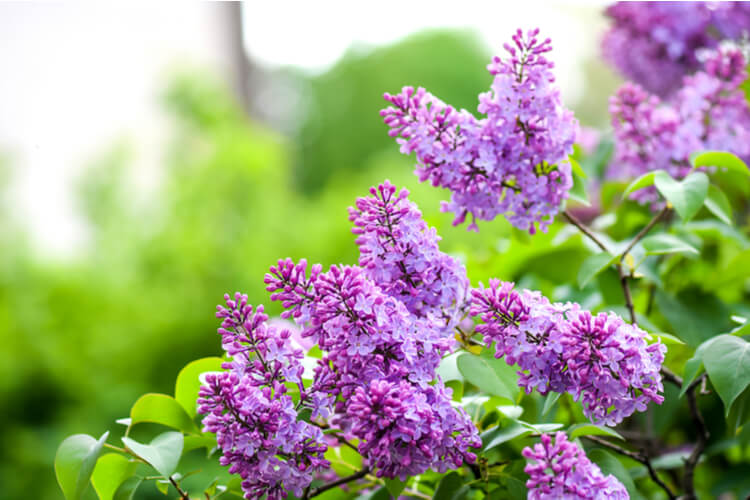
Image source: greengoddesscollective
Terpineol emanates a fragrance reminiscent of lilac, citrus, or apple blossom infused with notes of lime. While it constitutes a minor fraction of numerous plant essential oils, it serves as a coveted ingredient in perfumery and soap-making for its aromatic properties.
Commercially sourced terpineol is often derived through the processing of other terpenes, further augmenting its versatility and applicability in various industries.
4. PINENE
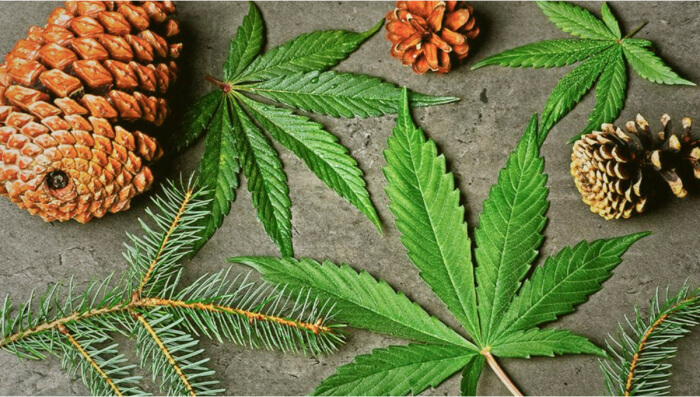
Image source: 2fast4buds
Pinene evokes the recognizable scent of pine trees and their resinous compounds. While prominently present in various plant essential oils, including rosemary, sage, and eucalyptus, pinene contributes to their distinctive aromatic profiles.
It is probable that pinene plays a significant role in imparting the characteristic odor to certain cannabis varieties, particularly those bearing a resemblance to the pungent aroma of skunk.
3. B-CARYOPHYLLENE
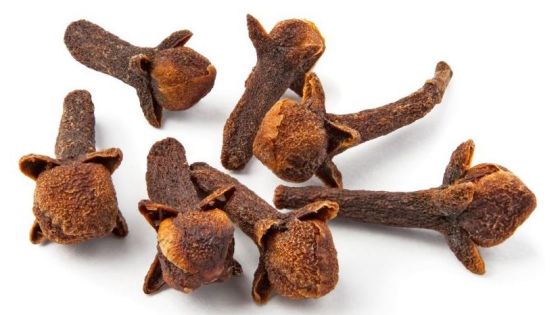
B-Caryophyllene emerges as a prominent terpene present in various botanical sources such as black pepper (15-25%), clove (10-20%), and cotton (15-25%). Characterized by its sweet, woody aroma reminiscent of dry cloves, this terpene offers a palate of flavors ranging from peppery spiciness to hints of camphor and astringent citrus undertones. Its inclusion significantly contributes to the robust spiciness associated with black pepper and finds industrial application in enhancing tobacco flavor profiles.
Ingested in significant quantities, B-Caryophyllene acts by blocking calcium and potassium ion channels, thereby mitigating pressure exertion by heart muscles. Furthermore, when applied topically, it demonstrates analgesic properties, making it a preferred ingredient in clove oil, a well-known remedy for toothaches. Notably, B-Caryophyllene interacts with CB2 receptor sites, the same targets for cannabidiol, suggesting potential anti-inflammatory effects. Its subtle woody essence adds depth to the overall flavor profile.
2. LIMONENE
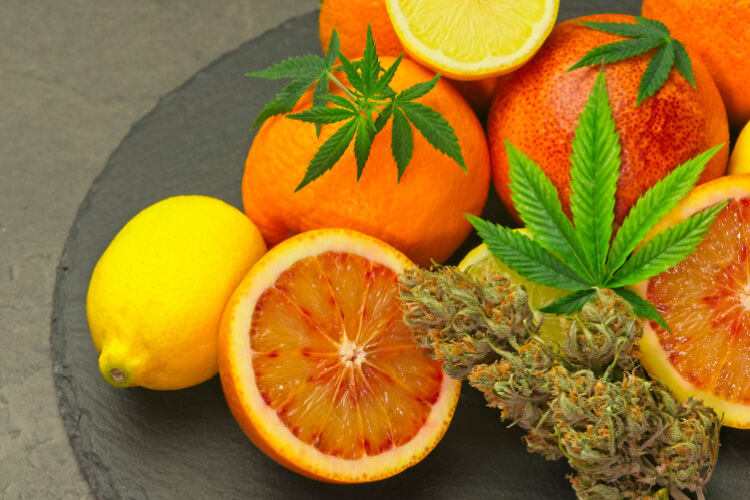
Image source: takomawellness
Abundant in the zest of citrus fruits and various other botanical sources, limonene ranks among the top terpenes found in cannabis resin, occupying the second, third, or fourth position depending on the strain. The unmistakable aroma of citrus rinds, released in a burst of fragrance upon peeling, owes its identity to the intricate structure of limonene.
Renowned for its multifaceted therapeutic properties, limonene exhibits potent antibacterial, antifungal, and anticancer activities. Its efficacy in combating fungal pathogens and potential carcinogens present in cannabis smoke streams underscores its significance in promoting respiratory health. Moreover, limonene acts synergistically to enhance the absorption of other terpenes by facilitating their penetration through cell membranes.
In humans, limonene demonstrates remarkable bioavailability, swiftly traversing the blood-brain barrier to elicit physiological responses. This includes an elevation in systolic blood pressure, indicative of heightened alertness and restlessness. Additionally, various analogs of limonene hold promise in modulating cognitive states, ranging from enhancing libido to fostering a sense of buoyancy or focused attention.
Notably, limonene-based sprays have emerged as a therapeutic intervention for depression, harnessing the terpene’s mood-lifting properties to alleviate symptoms and enhance emotional well-being.
1. MYRCENE
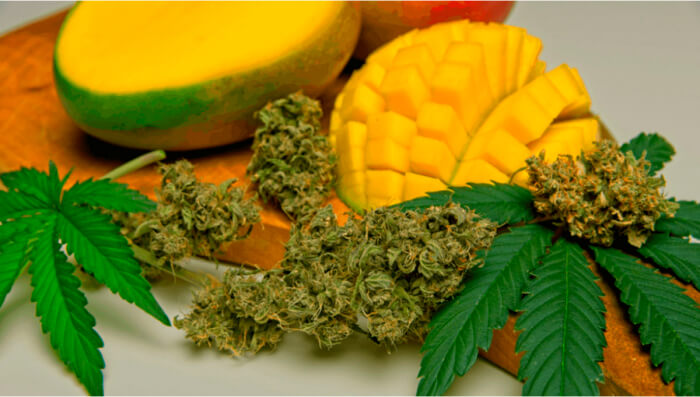
Image source: 2fast4buds
Among the plethora of terpenes found in cannabis, myrcene stands out as the most abundant across various strains. Beyond its prevalence in marijuana, myrcene is also notably present in significant quantities in hops, lemongrass, West Indian bay tree (utilized for bay rum production), verbena, and the plant from which it derives its name, myrcia. This versatile terpene is also detected in trace amounts within the essential oils of numerous other plant species.
Characterized by its complex aroma, myrcene exhibits notes reminiscent of cloves, earthiness, nuttiness, green vegetation, and citrus. These diverse scent profiles arise from subtle variations in the overall composition of essential oils. Indeed, these aromatic nuances are frequently employed to describe the distinctive fragrance of cannabis.
Interestingly, ripe mangoes are known to contain elevated levels of myrcene. Consuming a slightly overripe mango approximately 20 to 30 minutes prior to using marijuana allows myrcene to enter the bloodstream, potentially facilitating its interaction with THC. While the exact mechanism remains speculative, it is proposed that myrcene may aid THC in crossing the blood-brain barrier, thereby intensifying and hastening the onset of the psychoactive effects. This synergistic interaction between THC and myrcene is believed to culminate in a more potent and expeditious high.
In the same way that there is no universally agreed-upon favorite flavor of ice cream, there isn’t a single perfect combination of terpenes for everyone. Individual tastes, preferences, and circumstances all play a role in determining the ideal terpene profile for each person at any given time. However, by taking note of scents that are either favored or despised, individuals can better navigate toward cannabis strains that suit their specific preferences and needs.
As we unravel the complex interplay of terpenes within the cannabis plant, it becomes evident that these aromatic compounds are far more than mere fragrances—they are the architects of the enthralling sensory experience and the guardians of therapeutic potential. By understanding the distinct characteristics and effects of each terpene, cannabis enthusiasts and medical users alike can navigate the diverse landscape of strains with newfound appreciation and insight, unlocking the full spectrum of nature’s botanical treasures.
OPEN 7 DAYS A WEEK /
2897 MAPLETON AVE SUITE 800
BOULDER, CO 80301
303.539.6525
INFO@14ERBOULDER.COM
